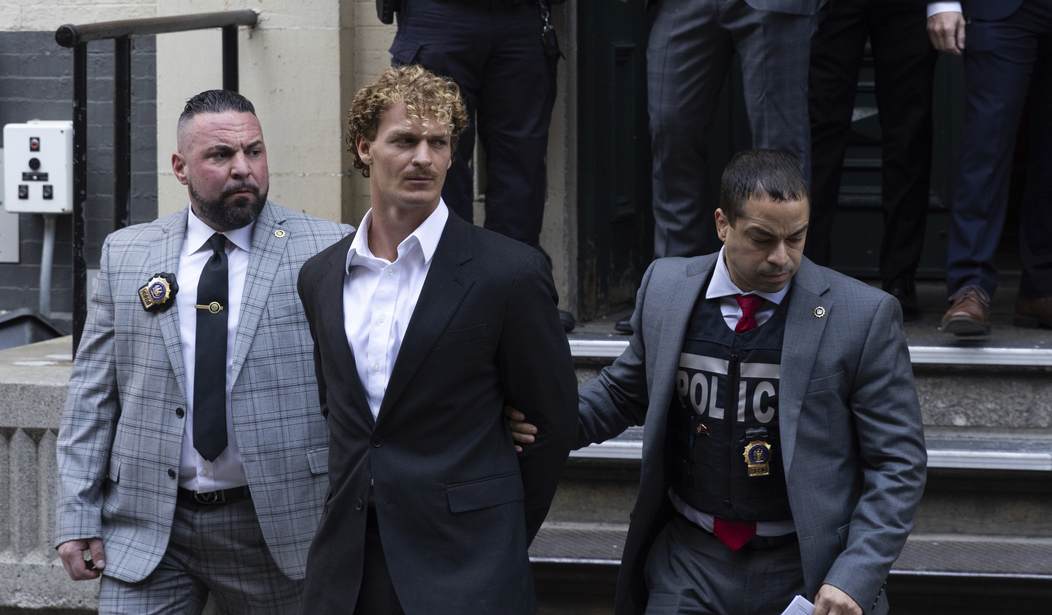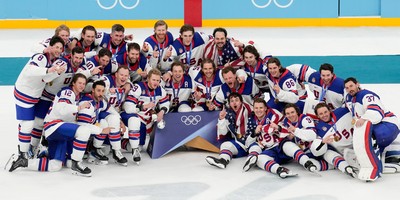Daniel Penny has been acquitted in the death of Jordan Neely.
A jury found Penny not guilty of criminally negligent homicide Monday following four-and-a-half days of deliberations and a month-long trial brought by Manhattan DA Alvin Bragg.
Penny, who was stoic through the entirety of the trial, let out his first smile when the forewoman read the verdict.
Neely's father, Andre Zachary, who has filed a lawsuit against Penny, had to be escorted out of the courtroom for his outburst.
Jurors told the judge Friday morning they couldn't come to a unanimous conclusion on the top charge of second-degree manslaughter, which carried a maximum sentence of 15 years in prison. However, Judge Maxwell Wiley directed them to continue mulling over the decision until they could all agree on whether to convict or acquit Penny.
When they still couldn't after being deadlocked all day, the prosecution filed a motion to dismiss the singular manslaughter count, hoping jurors would comprise on the remaining criminally negligent homicide charge, a less serious offense carrying up to four years behind bars. Wiley granted the dismissal motion despite the defense's objections.
Penny's defense attorneys argued that dropping the one in favor of the other could "coerce" the jury toward them deciding on a verdict. Moreover, it could set a precedent encouraging other prosecutorial offices to over-charge defendants, with the option to withdraw in the event of a hung jury, the defense added.
Wiley then sent the jurors home for the weekend to return Monday morning and deliberate again, this time only on the negligence charge. "You are now free to discuss Count 2," the jury told jurors. "You'll render a verdict on that one."
There was much debate over whether the jury should be allowed to move on to Count 2 if they were unable to reach a consensus on Count 1. The verdict sheet stipulated that consideration of Count 2 was contingent on the outcome of Count 1 deliberations. According to jury instructions, if Penny was found not guilty of Count 1, because the prosecution failed to disprove that Penny's actions were justified, the jury could not proceed to consider Count 2 and "must" find Penny not guilty of that charge.
Recommended
This is the verdict sheet from the Daniel Penny case, the issue that the jury is currently considering.
— Marina Medvin 🇺🇸 (@MarinaMedvin) December 6, 2024
The jury is stuck on Count 1. Count 2 hasn’t even come into play yet. Count 2 is contingent as explained in the form below. pic.twitter.com/pqGbZZiwd0
During deliberations concerning the manslaughter charge, jurors sent the judge a note asking for clarification in determining whether a person "reasonably" believed physical force was necessary. "What a reasonable person is is up to you to decide," Wiley replied. He offered a two-part test: Did Penny actually believe Neely would use deadly force? Would a reasonable person in Penny's position have held the same beliefs?
The tenor of that note suggested that the jury was split over Penny's justification defense, which placed the burden on the prosecution to prove beyond a reasonable doubt that the defendant's use of force was not justified.
That, coupled with a clear absence of causation in whether the chokehold directly caused Neely's death, made the case "factually complex," as Wiley told the jurors making up the fact-finding body.
The jury's decision Monday was reached within an hour of deliberations on the lower charge.
Beforehand, Wiley had clarified to the jury that the court was not directing them to "any particular verdict" or "even any verdict."
He also acknowledged the defense's concerns that the court had erred in moving on to Court 2 when Count 1 was no longer in play. "It seems novel, the issue that you can cure this by dismissing Count 1," he conceded.
The anti-Penny protests were audible from inside the courtroom located on the 13th floor. The defense raised the issue of the audible chants, such as "If we don't get no justice, they don't get no peace," saying such could be seen as threats against the jury. Meanwhile, the prosecution claimed that "there are numerous threats from the other side going on constantly."
Wiley agreed with the prosecution that there's been "shade thrown at the DA's office" and "particularly the ADA's handling of this case" "which I think is unfair."
The judge drew the line at anyone suggesting that Bragg was behind any of it. "Let's not even go there," he said.
Immediately after the judge tossed out the manslaughter charge, local Black Lives Matter leader Hawk Newsome declared outside the courthouse that the "KKK got another victory" and anyone who believes Penny is innocent has "racism in your heart."
"Racism has its tentacles all over this case and all over the minds of white America," he said.
Ahead of closing arguments on December 2, as Penny — as well as all 12 jurors — arrived at the courthouse, a mob of BLM protestors chanted, "Guilty! Guilty! Guilty!"
Since jury selection, BLM activists have protested out front every day of trial, holding signs accusing Penny of "Racist Vigilantism" and "White Supremacist Violence." Others demanded that the jury "Convict Daniel Penny" for "This Modern Lynching."
Notably, Penny wasn't arrested until 11 days after Neely died — when the BLM lobby, hoping to make Neely the next George Floyd, successfully pressured Bragg's office to prosecute Penny.
Throughout the trial, Bragg's underlings also tried to racially charge the case. Prosecutors claimed Penny "didn't recognize that Jordan Neely was a person" and saw him as someone who "needed to be eliminated," although they themselves depersonalized Penny, reducing him to his race in front of the jury.
Assistant district attorney Jillian Shartrand repeatedly referred to Penny as "the white man." At another point in the prosecution, a witness was asked: "Did it look like the white man was squeezing the black man's neck?" And one of the prosecution's witnesses, Johnny Grima, an unemployed homeless activist convicted of bashing someone with a bat, was permitted to point-blank call Penny a "murderer."
Penny's defense attorneys attempted to toss out the case over the inflammatory language, claiming the prosecution tainted the trial by peddling this "white vigilante" narrative. Judge Wiley, who presided over the proceedings, denied the defense's motion for a mistrial, but acknowledged, "I see what you're getting at." Penny's attorneys also asked Wiley to strike Grima's testimony entirely on grounds it was prejudicial. Wiley again rejected the defense's request.
The prosecution's race-baiting strategy stretched back to jury selection when Bragg's subordinates accused the defense of a racially motivated picking process that intentionally dismissed "people of color."
During voir dire, jurors were asked about their experiences, specifically on the subway. The defense's best bet was assembling a jury of subway riders for an accurate reflection of Penny's peers, as opposed to people who seldom take public transit. Thanks to an acclaimed trial consultant, who helped pick Kyle Rittenhouse's jury, the majority of jurors had experienced some form of negative interactions on the New York City subway system. Most had first-hand seen someone acting erratically. Three of them were commuters who have been harassed, and nine had witnessed outbursts. One woman who was chosen recalled a man yelling and swearing at her. "I think there are particular instances where force can be used," she said of such disturbances.
On May 1, 2023, a deeply disturbed Neely threatened to kill innocent bystanders aboard a busy New York City subway car, including women and children trapped on the train with him. Penny, a nearby straphanger and U.S. Marine Corps veteran, stepped in to subdue Neely, placing him in a six-minute chokehold, to protect other passengers fearing for their lives.
At the outset of trial, Bragg's deputies tried to control what witnesses could say about Penny, particularly how they're allowed to characterize him in court. Assistant DA Dafna Yoran said Wiley shouldn't let witnesses praise Penny as a "hero" or "good Samaritan" because that's subjective phrasing based on opinion.
"A witness's characterization of the defendant [as] a hero, for example, is the equivalent of a determination that the [defendant] was justified," Yoran asserted. Rather, it should be up to the jury to decide whether Penny's actions were warranted — not the witnesses testifying about the facts, she said. In response, Penny's counsel said their account of what happened deserved to be heard by the jury. "It describes what they perceived: Neely acting as the aggressor."
Nonetheless, a host of the prosecution's own witnesses, Penny's fellow passengers, provided testimonial proof that Penny acted rationally, courageously, and selflessly on behalf of others in a life-threatening situation. The eyewitnesses described on the stand how terror-stricken they felt when Neely charged at them and shouted "increasingly threatening" statements in their faces.
One woman recalled barricading her five-year-old son behind his stroller to shield him as Neely lunged in different people's directions. Although she lived in the Big Apple for 30 years and "seen a lot" riding the rails, "This felt different to me," the mother recalled. Another witness testified that she was "scared sh*tless" by Neely's escalating behavior and recounted how he threatened: "I don't give a damn. I will kill a motherf**ker. I'm ready to die." She even stuck around after Neely's drug-fueled rampage to personally thank Penny for defending her and everyone else in the crowded train car that day.
Although they conceded that his intent may have been "laudable," the prosecution argued that Penny acted "unnecessarily reckless" and went "way too far" with restraining Neely. Prosecutors said the crime occurred when Penny held him longer than he could have reasonably been considered an active threat.
Neely, who had an open arrest warrant at the time, was a known violent individual with an extensive criminal history, including separate subway assaults. In 2021, he punched an elderly woman, breaking her nose and fracturing an orbital bone. In 2019, he sucker-punched a man at a subway stop, the same place where Neely eventually encountered Penny.
In closing statements, Yoran said, "The defendant could easily have restrained Mr. Neely without choking him to death," adding, "So much less physical force would have done the job."
"Our society cannot allow citizens or the police, for that matter, kill people based on empty threats," the prosecutor continued. "You obviously cannot kill someone because they are crazy and ranting and looking menacing, no matter what it is that they are saying."
Penny's defense counsel countered: "The government wasn't there. The police weren't there when the people on that train needed help. Danny was."
"Who would you want on the next train ride with you?" Penny's attorney Steven Raiser asked the jury, prompting them to imagine they were sitting on the same train in a "tightly confined space" with "little room to move and none to run." His client "put his life on the line" for complete strangers, Raiser concluded.
According to police-worn bodycam footage shown in the courtroom, Neely was still alive when officers arrived on the scene. A pair of first responders reported that Neely had a detectable heartbeat. "I feel a pulse," one officer said, as a second cop confirmed. He was pronounced dead at a hospital hours later.
Penny wasn't informed of Neely's death either when he willingly spoke with investigators at the police precinct. "I'm not trying to kill the guy," Penny told detectives. "I'm just trying to de-escalate the situation." He added, "I'm just trying to keep him from hurting everyone else. That's what we learned in the Marine Corps. That's what you guys learn today as police officers."
























Join the conversation as a VIP Member